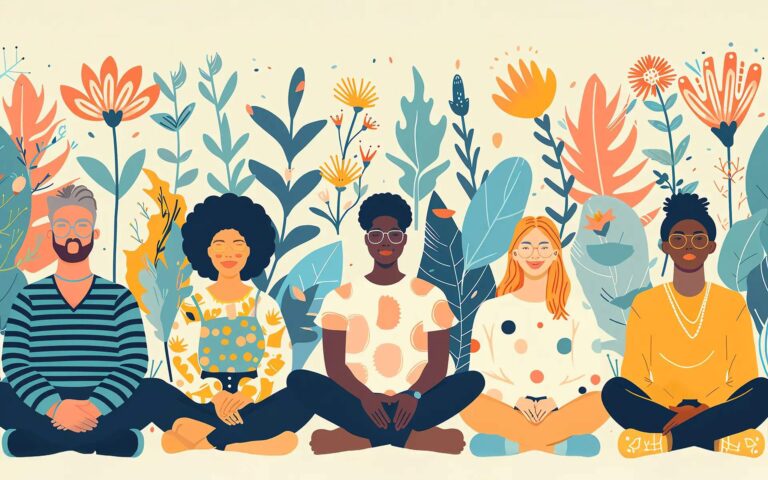Troy Landrum, a youth worker, faced burnout and feelings of inadequacy until a mindfulness retreat designed for Black, Indigenous, and People of Color educators helped him rediscover his purpose and connection to his community.
A year ago, I felt an overwhelming sense of exhaustion, as if my body was covered with graffiti-like reminders of fatigue. After a decade of working in youth development and education, especially with young people who were incarcerated or faced various challenges, I found myself constantly battling the heavy emotions of secondary trauma, survivor’s guilt, and a bleak outlook for their future. I had witnessed the hardships these youth faced navigating a justice system and other institutions that often fell short of addressing their needs. This relentless dedication took a toll on my emotional well-being, leading me to the brink of burnout.
During this challenging period, I focused on advocating for young individuals and their families, guiding them through legal processes, finding employment opportunities, and mentoring them during tough times. Yet, I struggled to recognize that just as their hope and motivation needed to stem from within, I too had to cultivate my own source of hope and motivation. Understanding this was essential for seeking the support and help I needed, being honest about my struggles, nurturing a sense of community for healing, and taking proactive steps towards my own future. I repeatedly reminded young people that they were in control of their own journeys, writing their unique stories. It was crucial for them to have a supportive community that believed in them and encouraged them to realize their potential. I just wasn’t ready to acknowledge that I deserved the same support.
I repeatedly reminded young people that they were in control of their own journeys, writing their unique stories. It was crucial for them to have a supportive community that believed in them and encouraged them to realize their potential. I just wasn’t ready to acknowledge that I deserved the same support.
Then I attended my first meditation retreat designed for BIPOC educators, hosted by the non-profit Space Between, which integrates mindfulness practices into school environments to help children.
Finding My Place at the Retreat
As I prepared for the retreat, I sought to reconnect with my body and regain a sense of optimism that had faded away, hoping it would strengthen my resolve to support and educate young people. Initially, I found myself questioning whether I truly belonged in a space meant for educators, a role I held in high regard.
Having grown up in a family of educators, I deeply appreciated the dedication such roles require. To me, being an educator meant being a teacher, professor, or administrator—someone deeply involved in preparing youth for higher learning. As a youth worker who briefly entered and exited the lives of these young people—to help them out of challenging situations or guide them through internships—I felt like a fraud. Listening to the fulfilling stories shared by my mother and grandmother about their classroom experiences made me feel insignificant; even though I was worn out, their burdens seemed far greater.
It was a space where I could immediately set aside all the burdens I had brought with me, sinking into the comfort of yoga mats and bean bags. Instantly, I felt a wave of peace wash over me.
On that Saturday morning when I arrived, the aroma of coffee and the smiles of familiar faces embraced me. A warmth enveloped me that I knew only fellow BIPOC could truly grasp—a silent understanding that we were all part of the same struggle to be recognized and valued in our society. It became a sanctuary where I could let go of the weight I had been carrying, settling into the inviting yoga mats and bean bags. I experienced a profound sense of tranquility.
The facilitators allowed us time to enjoy snacks, connect with one another, and prepare for a day of bonding with fellow participants, engaging with ourselves and the present moment. We formed a large circle of about ten individuals from various parts of Washington, taking turns to share our names and experiences. I went last, and as I listened to everyone share their roles, fatigue, and challenges, I felt my own imposter syndrome dissolve away like beads of sweat in the steam of a sauna.
Rediscovering Love
The moments we shared were a meditative retreat for our spirits, woven together with the soothing sounds of singing bowls, meditative walks, and deep discussions that resonated among our tired voices. It became a haven for those who saw themselves or wanted to see themselves as beacons of hope for others. I realized there are many pathways to engaging with young people, countless definitions of what it means to be an “educator.” The retreat wasn’t exclusive; it was a space for everyone needing a reminder of the light within them.
Regardless of our professions or connections to youth education, we all arrived at the retreat feeling drained. I had worn my fatigue like a badge of honor, possibly to affirm my belonging, or as a response to the societal injustices that burden BIPOC individuals to navigate systems not of our making.
What I gained from this experience was transformative for my mind, body, and soul. That day’s message echoed within me: “Rest and bring your whole self, regardless of who you are. Embrace this day and all the days to come by loving yourself, nurturing yourself, and listening to your inner voice. In doing so, you can extend that love to others and serve as a reminder of that love for those around you.”


